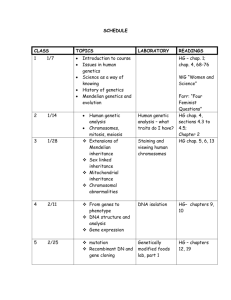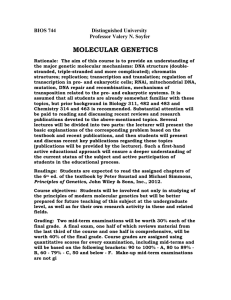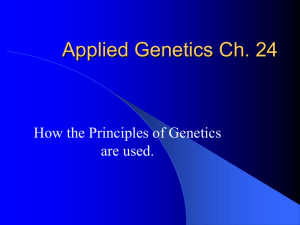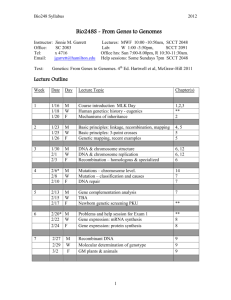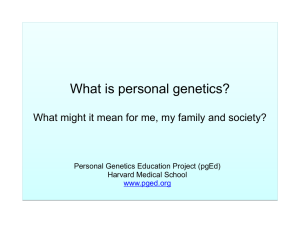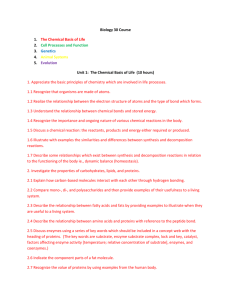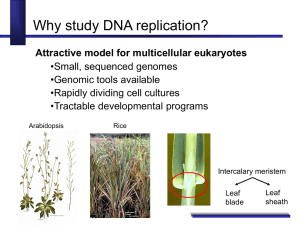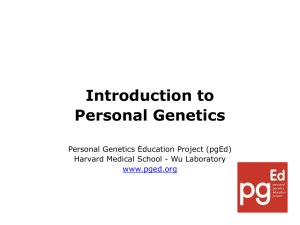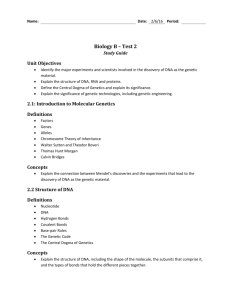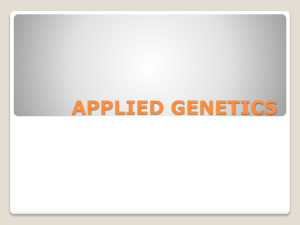Genetics 2014/2015
advertisement
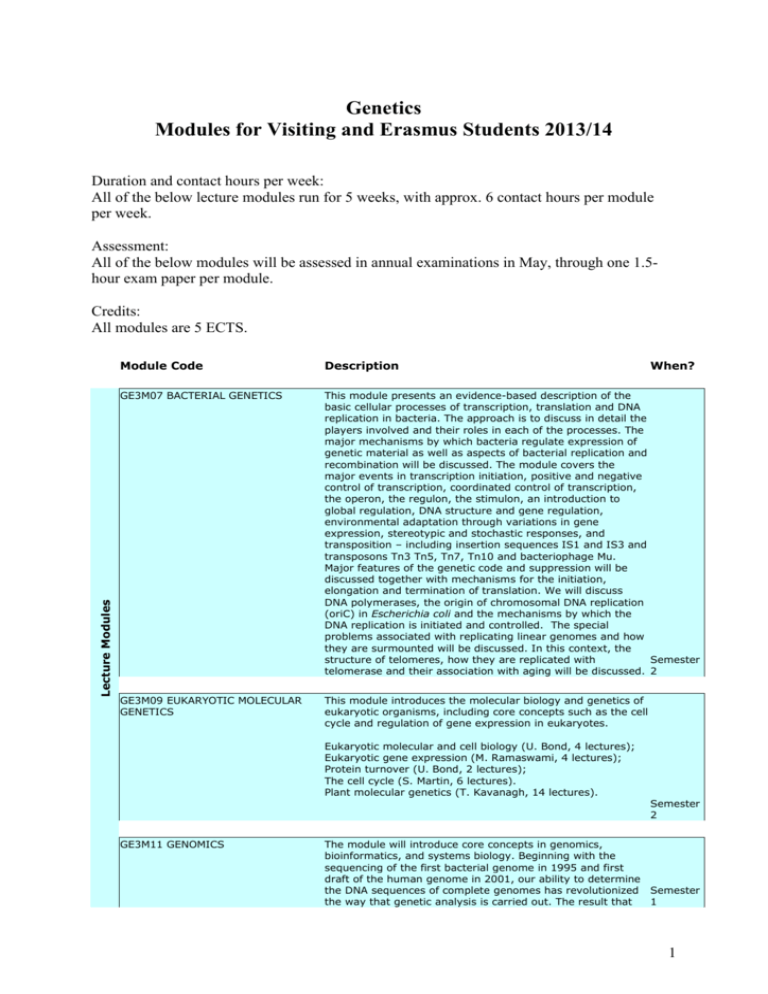
Genetics Modules for Visiting and Erasmus Students 2013/14 Duration and contact hours per week: All of the below lecture modules run for 5 weeks, with approx. 6 contact hours per module per week. Assessment: All of the below modules will be assessed in annual examinations in May, through one 1.5hour exam paper per module. Lecture Modules Credits: All modules are 5 ECTS. Module Code Description GE3M07 BACTERIAL GENETICS This module presents an evidence-based description of the basic cellular processes of transcription, translation and DNA replication in bacteria. The approach is to discuss in detail the players involved and their roles in each of the processes. The major mechanisms by which bacteria regulate expression of genetic material as well as aspects of bacterial replication and recombination will be discussed. The module covers the major events in transcription initiation, positive and negative control of transcription, coordinated control of transcription, the operon, the regulon, the stimulon, an introduction to global regulation, DNA structure and gene regulation, environmental adaptation through variations in gene expression, stereotypic and stochastic responses, and transposition – including insertion sequences IS1 and IS3 and transposons Tn3 Tn5, Tn7, Tn10 and bacteriophage Mu. Major features of the genetic code and suppression will be discussed together with mechanisms for the initiation, elongation and termination of translation. We will discuss DNA polymerases, the origin of chromosomal DNA replication (oriC) in Escherichia coli and the mechanisms by which the DNA replication is initiated and controlled. The special problems associated with replicating linear genomes and how they are surmounted will be discussed. In this context, the structure of telomeres, how they are replicated with Semester telomerase and their association with aging will be discussed. 2 GE3M09 EUKARYOTIC MOLECULAR GENETICS This module introduces the molecular biology and genetics of eukaryotic organisms, including core concepts such as the cell cycle and regulation of gene expression in eukaryotes. Eukaryotic molecular and cell biology (U. Bond, 4 lectures); Eukaryotic gene expression (M. Ramaswami, 4 lectures); Protein turnover (U. Bond, 2 lectures); The cell cycle (S. Martin, 6 lectures). Plant molecular genetics (T. Kavanagh, 14 lectures). GE3M11 GENOMICS When? Semester 2 The module will introduce core concepts in genomics, bioinformatics, and systems biology. Beginning with the sequencing of the first bacterial genome in 1995 and first draft of the human genome in 2001, our ability to determine the DNA sequences of complete genomes has revolutionized Semester the way that genetic analysis is carried out. The result that 1 1 the study of genomes is central to all modern genetics. This module provides an introduction to: the methods and technologies used to sequence genomes; molecular genetics techniques that can exploit genomic data to be used to study the function of genes; bioinformatics, which is the use of computers to store and analyse genomic and other large-scale molecular biological data; and systems biology, which is the study of how genetic networks and whole cells work GE3M13 NEUROGENETICS AND DROSOPHILA The module will introduce the fundamentals of neuronal architecture, neuronal excitability and synaptic function, sensory systems, circadian rhythms, perception and learning and their analysis by genetic methods in model organisms (M. Ramaswami). It will introduce the genetics of neural development and behaviour, including psychiatric and cognitive genetics, and principles of nervous system evolution (K. Mitchell). These topics will also describe methods for neurogenetics in the fruitfly Drosophila melanogaster, the mouse and in humans. The module will also consider more generally the principles and logic of genetic analysis, using Semester detailed examples from Drosophila (P. Labrador). 2 GE3M15 MEDICAL GENETICS The module introduces the genetics of human disease, from simple Mendelian traits to complex multigenic diseases and gene/drug interactions. Topics include the development of medical genetics from 1752 to the ‘post-genome’ era; the spectrum of human autosomal recessive diseases; RFLP analysis and the statistical evaluation of linkage data; localization and isolation of the Huntington disease gene; congenital diseases caused by chromosomal imbalance; diseases involving repeat expansions; developments and setbacks in the use of gene and molecular therapies for treatment of hereditary diseases; and pharmacogenomics (interaction of genetic background with drug response). The module also covers analysis of quantitative traits: complex human diseases such as type 2 diabetes; approaches to mapping genetic variants responsible for complex traits; heritability; genome wide association mapping. GE3M17 EVOLUTIONARY GENETICS Semester 2 This module provides an introduction to genetic variation – its origins and its evolutionary consequences. The information in DNA is not always transmitted accurately from one generation to the next. DNA sequences can change spontaneously by the process of mutation and inaccurate DNA repair, resulting in genetic variation (polymorphism) within populations. Variable sites at different positions in the genome get shuffled into new combinations by the process of genetic recombination that occurs during sexual reproduction. Whether a particular variant (allele) survives for a long time in a population or goes extinct depends on the evolutionary forces acting on the population. If a new allele is advantageous to the population, Darwinian natural selection will tend to increase its frequency in the population; alternatively, if the new allele is disadvantageous natural selection will tend to eliminate it. However, if the population is small, random events (genetic drift) can overcome the Semester power of natural selection. 1 2
